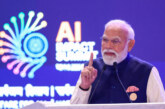
Dr. Arvind Kumar*
The hallowed halls of Johannesburg witnessed history unfold recently, as the G20 Leaders’ Summit convened for the first time on African soil; a watershed moment that crystallised the shifting sands of global geopolitics. It emerged not merely as another congregation of world leaders, but as a profound declaration that the architecture of global governance is undergoing an irreversible metamorphosis. For India, the Johannesburg Summit represented far more than diplomatic attendance; it was an affirmation of New Delhi’s ascendant role as the conscience-keeper of the Global South and the indispensable bridge between the developed and developing worlds. Hon’ble Prime Minister Narendra Modi’s participation in it carried the gravitas of continuity, building upon the historic foundations laid during India’s transformative presidency in New Delhi in 2023.
The Ubuntu Moment
Against the backdrop of unprecedented geopolitical turbulence, the conspicuous absence of the United States, which chose to boycott the summit; the 122-point Johannesburg Declaration emerged as a testament to the resilience of multilateralism. Where cynics anticipated paralysis, the Global South delivered consensus. The declaration’s early adoption on the summit’s opening day, rather than at its conclusion, was a masterstroke of diplomatic choreography by the South African presidency. The invocation of Ubuntu, the African philosophical principle that proclaims “I am because we are” resonated throughout the summit’s proceedings, serving as a philosophical counterweight to the transactional diplomacy that has increasingly characterised great power politics.
Prime Minister Modi’s interventions at the summit transcended conventional diplomatic rhetoric, weaving together India’s civilizational wisdom with pragmatic solutions to contemporary global challenges. His articulation of “Integral Humanism” as a development paradigm, one that views humans, society, and nature as an integrated whole offered a compelling alternative to the exploitative growth models that have driven environmental degradation and widening inequalities. India’s presidency also advanced initiatives rooted in equity and shared prosperity, including G20 Global Traditional Knowledge Repository speaks to humanity’s collective inheritance, the accumulated wisdom of millennia that offers sustainable solutions to modern predicaments. The Africa Skills Multiplier Initiative, envisaging one million certified trainers across the African continent, represents India’s commitment to capacity-building rather than aid dependency.

The proposal for a G20 Global Healthcare Response Team draws upon lessons from the pandemic era, while the Open Satellite Data Partnership democratises access to space-based resources for agriculture, disaster management, and fisheries. The Critical Minerals Circularity Initiative addresses supply chain vulnerabilities through recycling and urban mining, reducing the stranglehold of resource monopolies. Perhaps most consequentially, the G20 Initiative on Countering the Drug-Terror Nexus targets the financial arteries of terrorism; a cause India has championed with unwavering resolve.
The India-Brazil-South Africa (IBSA) meeting on the summit’s side-lines reinforced this axis of democratic developing nations, with leaders issuing a resolute call for United Nations Security Council reform no longer an aspiration but a necessity. The revival of IBSA as the “democratic voice of the Global South” gains particular significance as BRICS expands to include nations with varied governance systems. For India, the Johannesburg Summit validated its strategy of strategic autonomy engaging constructively with both Western powers and Global South partners without subordinating national interests to any bloc. This diplomatic dexterity was exemplified by the announcement of the Australia-Canada-India Technology and Innovation (ACITI) Partnership, simultaneously deepening ties with traditional partners while championing Global South causes.
Prime Minister Modi’s bilateral engagements on the summit’s margins with South African President Cyril Ramaphosa, Japanese Prime Minister, Canadian counterpart, and others demonstrated India’s capacity for simultaneous multi-vector diplomacy. The conversations with President Ramaphosa, encompassing AI cooperation, digital public infrastructure, critical minerals, and South Africa’s support for India’s upcoming BRICS Chairship in 2026, illustrated the depth of India-Africa solidarity. The thaw in India-Canada relations, marked by agreements to negotiate a Comprehensive Economic Partnership Agreement targeting bilateral trade of USD 50 billion by 2030, represents diplomatic pragmatism triumphing over recent tensions. These outcomes underscore India’s emergence as what analysts have termed the “intellectual and strategic anchor” of the G20.
The Johannesburg Declaration’s substantive outcomes merit attention beyond their symbolic significance. The pledge to move climate finance from billions to trillions directly tackles the Global South’s USD 5.8–5.9 trillion pre-2030 funding gap. The Cost of Capital Commission recognises long-standing financial inequities, including the disproportionately high borrowing costs faced by African nations. Mission 300, targeting electricity access for 300 million Sub-Saharan Africans by 2030, reflects the scale of partnership needed to shift development pathways. The Nelson Mandela Bay Target on youth employment and the pledge to achieve 25% gender parity in labour-force participation by 2030 further underscore a comprehensive human-development agenda.
The Calculus of Consequence
The Johannesburg G20 Summit will be remembered as the moment when the Global South demonstrated that it could lead, not merely participate, in shaping global governance. For India, the summit reinforced New Delhi’s position as a civilisational voice in a transactional world. As the presidency now transitions to the United States, the challenge for New Delhi will be to preserve the developmental orientation achieved over four consecutive Global South presidencies. The age of Vasudhaiva Kutumbakam, the world as one family is no longer merely an ancient Indian aphorism but an organising principle for global governance in an era of shared challenges. The seeds planted in Johannesburg, nurtured by India’s diplomatic cultivation, may yet bear the fruit of a more equitable world order. In the grand chessboard of international relations, India has moved from being a piece to becoming a player and increasingly, a rule-maker.
*Editor, Focus Global Reporter





